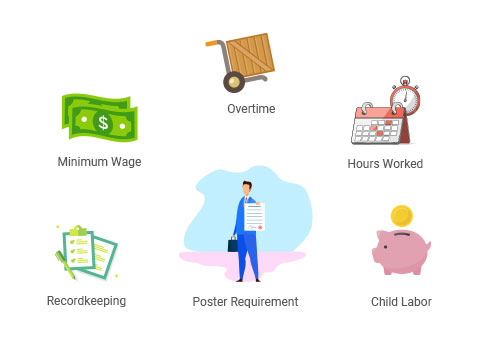- Home
-
-
-
-
Human Resource
- Onboarding
- Time and Attendance
- Payroll
- HR Compliance
-
-
- Resources
- About Us

FLSA is a federal labor law enforced by the U.S Department of Labor which sets out various labor regulations on minimum wage, overtime pay eligibility, recordkeeping, and child labor standards both in the private and public sectors in the federal, state, and local governments.FLSA protects workers against certain unfair labor practices on wages and hours of work. FLSA is administered by Wage and Hours Division (WHD) of the Department of Labor (DOL)
FLSA Regulations
- Employees covered under FLSA are subject to Minimum wages and overtime pay based on the exempt and nonexempt status of the employee
- Exemption status of an employee is decided on the standards specified in the FLSA Act and is considered on multiple factors such as
- How much money they earn
- What type of work they do
- Their specific responsibilities and job duties
- Covered nonexempt employees are entitled to a minimum wage of not less than $7.25 per hour effective July 24, 2009 subject to both state and federal minimum wage laws, the employee is entitled to the higher minimum wage.

- Covered nonexempt employees are entitled and must receive overtime pay for hours worked over 40 per workweek (implies to any fixed and regularly recurring period of 168 hours – seven consecutive 24-hour periods) at a rate not less than one and one-half times the regular rate of pay subject to both state and federal overtime pay laws where the employee is entitled to the higher overtime pay that benefits the employee more.
- Exemption for Minimum wages and overtime pay is applicable to employees who are classified as executive, administrative, professional, computer, highly compensated, and outside sales employees.
- To qualify for a bona fide exemption, employees generally must meet certain tests regarding their job duties and be paid on a salary basis at not less than $684* per week. Job titles alone do not determine exempt status. An employee is deemed for an exemption if an employee’s specific job duties and salary threshold meet all the requirements of the Department’s regulations as defined in the FLSA Act.
- There is no limit on the number of hours employees of 16 years or older may work in any workweek.
- The FLSA does not require overtime pay for the employees who work on weekends, holidays, or regular days of rest unless overtime is worked on such days.
- Hours worked by an employee ordinarily include all the time during which such employee is required to be on the employer’s premises, on duty, or at a prescribed workplace.
- Recordkeeping – Employers must keep employee time (log) and pay records.
- Poster requirement – Employers must display an official poster outlining the requirements of the FLSA.
- Child labor regulations prohibit individuals younger than eighteen years old from working in certain jobs (Youth employment law) and additionally sets out certain rules concerning the hours and times of employees under sixteen years of age may work.


